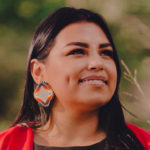Connecting the Dots
We have to do a better job of connecting the dots between systemic racism and the impact of the COVID-19 pandemic; between Black Lives Matter and supporting our students; and between the people who have supported us and the people we—as a society—don’t do enough to support.
We must do a better job of connecting the dots.
Emma Vadehra
The COVID-19 pandemic is disportionately impacting Black communities. Unprecedented economic disruption and job losses are disproportionately impacting Black communities. Police brutality and violence are disproportionately impacting Black communities.
Coincidence? We think not.
At Next100, we believe the challenges we face as a society are structural, not individual. We believe these challenges are interconnected, not siloed. We believe they are the outcomes of policies and systems aided and abetted by structural racism, not unintended consequences.
But we also believe we, as activists, advocates, policy analysts, and people, don’t do a good enough job of connecting the dots—of how racism informs our systemic and individual failures; and of how police brutality is a particularly horrifying symptom, but the underlying cause is a systemic devaluing of Black lives that pervades our policy choices day in and day out, from our housing policies to our schools. We must affirmatively recognize the value and contributions of Black Americans who built our country and our communities every single day, not just acknowledge “Black history” once a year.
It’s good to have a conversation about police disciplinary records. It’s better to truly understand and act to address our “new Jim Crow” criminal justice system, and to improve the schools that send too many Black children—especially Black boys—into that system when they should be learning. It’s good to try to get desperately needed tests and ventilators to communities being hardest hit by COVID-19. It’s better to address the health disparities and inadequate access to health care that always hit communities of color hardest—as well as the environmental disparities that do the same.
We need to do a better job of seeing the throughlines and connecting the dots. Issues are not siloed. Lives are not siloed. Inequities are not siloed. And so solutions cannot be siloed.
We need to do a better job of seeing the throughlines and connecting the dots. Issues are not siloed. Lives are not siloed. Inequities are not siloed. And so solutions cannot be siloed.
But are we acting on these underlying challenges, or just responding to the moment at hand? Are we taking full advantage of this policy window to make the case for addressing the systemic inequities?
We at Next100 wanted to take a moment to reflect and connect the dots between systemic racism and the impact of the COVID-19 pandemic; between Black Lives Matter and supporting our students; and between the people who have supported us and the people we—as a society—don’t do enough to support.
Failing to Recognize Interconnectedness Allows Systemic Oppression to Continue
Phela Townsend
For me, effective, systemic policy change begins with seeing the world through a particular lens—one that:
1) Recognizes that while certain issues appear to be separate and operating in different spheres of our lives, in fact, they are interconnected and reinforce one another;
2) acknowledges how they are produced and reified in our daily lives; and
3) realizes that systemic oppression persists because we fail at both #1 and #2.
Failing to understand the true nature of systemic oppression engenders a falsehood that simply passing anti-slavery, anti-racism, or anti-discrimination laws is sufficient to create the equity we profess to want. In reality, the ideas, policies, practices, and norms that those laws are intended to address, continue; they just evolve and operate in different, more insidious and invisible ways, relying on (and bolstered by) cheap labor and exploitation, sexism, and other forms of social oppression. Certainly, the recent and ongoing history of police brutality in this country shows us that some forms of oppression remain violent and overt. However, others have simply transformed into quieter, more subtle forms, embedded in the daily rituals, practices, languages, and symbols necessary for their survival, reproduction, and legitimization.
Failing to understand the true nature of systemic oppression engenders a falsehood that simply passing anti-slavery, anti-racism, or anti-discrimination laws is sufficient to create the equity we profess to want.
Take policing. Effective policy change around policing begins with us seeing the issue not only as a matter of criminal justice policy (although it is one) but also as one affecting education, labor, immigration, and so many other issues. For example, Black men and women are not the only victims of police brutality. The immigrant community, Black and non-Black alike, knows this all too well. In our schools, students of color are disciplined at higher rates and receive stricter penalties than their white peers, which makes them more likely to end up in the criminal justice system. Delivery drivers, Airbnb guests, even residents of color are racially profiled and surveilled in predominantly white communities—not only by members of those communities, but also by tech companies that develop home cameras and surveillance products and partner with law enforcement to use—really, to mis-use—that data.
To truly get to the root causes of—and thus adequate solutions to—police brutality, we must interrogate and confront the patterns and practices in all areas of all of our lives that reinforce and give rise to police brutality—all of us, not just members of the Black community. Let’s take this moment to do that.
Our children are the future. They deserve us being honest about the past.
Isabel Coronado
In my time at Next100, I have decided to focus on the mass incarceration of Indigenous people, and on the children of incarcerated parents who ultimately live with the impacts of incarceration the longest. I come from a community that has for centuries felt the impacts of systemic racism—from our removal from tribal homelands to genocide, boarding schools, mass incarceration, and so on. I have gained clarity from the Black Lives Movement about how much our generational cycle of trauma has perpetuated and exacerbated the current issues we are facing. I have gained clarity that without healing from our past traumas, individually and collectively, usually not inflicted by ourselves, it is much harder to do the work to reconcile the past.
I was moved when I heard Gianna Floyd (George Floyd’s youngest daughter) yell out, “Daddy changed the world.” But we can’t forget the very real fact that Gianna and her siblings lost a father. They will endure another individual generational cycle of trauma, just as the Black community as a whole will. She is just like the millions of children who endure a lost family member to police brutality, violence, and incarceration.
How can we prevail in leaving a meaningful legacy for children without being honest about and reconciling with the past?
How can we prevail in leaving a meaningful legacy for children without being honest about and reconciling with the past?
The past that has given us thousands of statues of old, white, racist men? That has brought us the present, in which these statues persist.
The past where people flew the Confederate flag with pride? That has brought us the present, in which so many people continue to fly that flag.
The past where our communities are not fully funded or supported? That has brought us the present, where we are still forced to fight at the federal, tribal, state, and local level for our fair share—and are usually left behind.
Our history books are written without truth or acknowledgment of what the Black community has contributed to our society. Black children are growing up in our school systems without knowing the full truth of the great things Black people have built and nurtured. Without giving them this knowledge, we can’t hold an honest conversation with our nation’s youth.
We can’t continue to move forward without facing our past.
Black Children Matter
Roquel Crutcher
Trayvon Martin and I were the same age in 2012 when he was murdered by George Zimmerman. When I think about the most influential person in my lifetime, my mind automatically goes to the young boy that pushed the entire world to say: Black Lives Matter. A seventeen-year-old in a predominately white school, I remember grieving my skin and having to keep it moving. This is unfortunately the case for many Black kids experiencing racism and exhaustion. Here are three ways they have to internalize and bear that burden: Physically, mentally, and psychologically.
- Physical exhaustion: “Racial battle fatigue,” a condition named and studied by William A. Smith, describes how “students of African descent constantly worry, have trouble concentrating, become fatigued, and develop headaches when navigating personal and professional spaces that have historically favored white people.”
- Mental exhaustion: In a study related to mental health, Cornell University says that “racial disparities have far-reaching effects as children develop, including infant mortality rates, mental health problems (e.g., depression and anxiety), and behavioral issues (e.g., attention deficit hyperactivity disorder).”
- Psychological exhaustion: Similar to both physical and mental exhaustion, psychological exhaustion focuses on the emotional health of people. The American Psychological Association continues to study the impact racism has on Black people. When discussing the sacrifices made by the students from the Greensboro sit-ins, they say that “the enormous personal stress that they likely experienced as they occupied those stools is less often considered.” Unfortunately, having to deal with stressors mentally and physically tends to take priority, a deferment which impacts the psyches of Black people forever.
Black people are carrying and processing so much pain with them every single day, but Black kids are carrying and processing pain while also learning about themselves, the world, and the impact of both their brain development.
Black people are carrying and processing so much pain with them every single day, but Black kids are carrying and processing pain while also learning about themselves, the world, and the impact of both their brain development. Even as we fight, we must prioritize our kids and the impact the movement is having on them physically, mentally, and psychologically.
Who taught you?
Rosario Quiroz Villarreal
My family and I migrated to the United States halfway through my first grade year. I finished first grade in California with a teacher who spoke Spanish and would translate instructions for me. Then I moved to North Carolina. I attended summer school and didn’t understand a thing. When I read as I would in Spanish, students laughed at me for my accent.
Second grade was different though. When I read in Mrs. Jones’ class, no one laughed, and there was nothing about the way she interacted with me that made me feel I needed remediation. She recognized I could read and she supported me in learning the funny rules of English. She also talked about politics and voting like it was commonplace, as we excitedly followed the 1996 presidential race. In fifth grade, Mrs. Jackson and Mrs. Gary set an especially high bar for rigor. Mrs. Jackson constantly encouraged us to ask questions, unashamedly offering her own experiences with being known for questioning her own teachers and professors. Mrs. Gary was fair and just. In her class, there was no favoritism and effort mattered above all else.
Black women taught me about seeing things for what they are. Black women taught me to dig deeper by questioning. Black women taught me about justice.
These teachers—Mrs. Jones, Mrs. Jackson, and Mrs. Gary—were all Black women. Black women taught me about seeing things for what they are. Black women taught me to dig deeper by questioning. Black women taught me about justice. They taught me about the importance of safe and supportive spaces. They exuded excellence. And they never made assumptions about me or my ability based on my English proficiency. Black women taught me, and they imparted powerful lessons throughout the process.
Today, I continue to learn from Black women. Kimberlé Crenshaw provided me with a deeper lens through which we could understand social inequity when she coined intersectionality. I owe a deeper understanding of the intersections of racism and xenophobia to Denea Joseph and Kai Martin. I am in awe of Gloria Ladson-Billings and Bettina Love for their insight and dedication to education equity through culturally relevant pedagogy and abolitionist teaching. Black women are pushing this nation to realize a higher version of itself, and it’s time we all listen. We can start by valuing the life of every Black woman and demanding justice for the loss of their lives at the hands of police. Breonna Taylor’s killers—Brett Hankison, Jonathan Mattingly, and Myles Cosgrove— have yet to face criminal charges, and until they do, we will #SayHerName.
The Poverty of Early Childhood Educators Is a Policy Choice
Levi Bohanan
For centuries in this country, we have expected women to raise children for little to no compensation. Phrases I hear in conversations with families and policymakers, like teaching early education is “a labor of love,” are not appropriate excuses, and cannot serve as deflections, for deeply problematic systems which disenfranchise a significant number of women of color. These phrases are a part of systemized racism and perpetuate violence against women of color. The early childhood education system must address the deeply entrenched systemic racism which prevents the expansion of high-quality, affordable child care and early learning for everyone, and which continues to systematically devalue the labor of women of color.
Sixty-five percent of the child care workforce receives public benefits, and 78 percent of early childhood educators worry about having enough money to pay their family’s monthly bills. Teaching in early care and education programs is one of the lowest-paid occupations in the United States.
Institutionalized racism is part of the reason we have an underfunded child care system and an underpaid child care workforce. The specter of an era which many may think has gone by still looms over the early childhood education system.
It’s not a coincidence that we have an underpaid, undervalued early childhood workforce that consists disportionately of women of color—nearly 40 percent of the early education workforce is made up of people of color, nearly half of whom identify as Black. Institutionalized racism is part of the reason we have an underfunded child care system and an underpaid child care workforce. The specter of an era which many may think has gone by still looms over the early childhood education system.
It’s not a coincidence. It’s a policy choice—one that devalues the women of color who work as early childhood educators; one that devalues the women across the workforce who are harmed by lack of access to high-quality child care. It’s a choice.
I believe that we have to invest in early childhood education. We need to invest in the workforce and pay early educators the salary they deserve, and we need to invest in children and provide to them a meaningful opportunity to develop the skills they will need to succeed academically for years to come. Doing so will expand opportunity threefold; for early childhood educators, kids, and parents.
We Can’t Address Climate Change without Confronting Racism
Daniel Munczek Edelman
As the broader American public finally prioritizes addressing climate change, I have primarily seen a couple explanations for why our natural environment is deteriorating so rapidly. Yes, these trends derive from money in politics and the influence of extractive industries. Yes, political partisanship has indeed hampered efforts to fight climate change. But, until recently, few journalists who weren’t explicitly on the “race beat” acknowledged that climate change is inextricably intertwined with racism.
This missing narrative is no coincidence. To quote Julian Brave Noisecat, “The institutions of environmental power—elected officials, government bureaucracies, nonprofits, laws, and the like—were, almost as a rule, created by white men and often remain dominated by white people.” White institutions have ignored—or inflicted—severe environmental damage upon people of color, and Black people in particular.
Communities of color have faced vastly more exposure to pollution and environmental disasters—climate-related and otherwise—than their white counterparts. To select just two recent examples, environmental racism has contributed to people of color facing drastically higher death rates from COVID-19, and to African-American mothers being far more likely to have babies who are premature, underweight, or stillborn. And then there’s Flint. And Katrina. And the battle over the Dakota Access Pipeline. The list goes on.
Climate justice is racial justice. We cannot achieve one without the other.
The Movement for Black Lives’ recent successes suggest that a more just society is closer to being realized than it has been in a long time. And as the Movement and its allies demand that the state itself not kill with impunity, may we also ensure that everyone lives on a healthy planet with clean air and water. Climate justice is racial justice. We cannot achieve one without the other.







